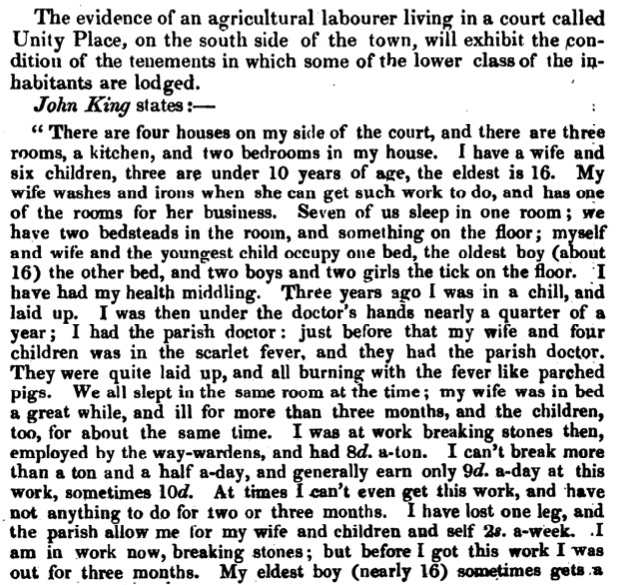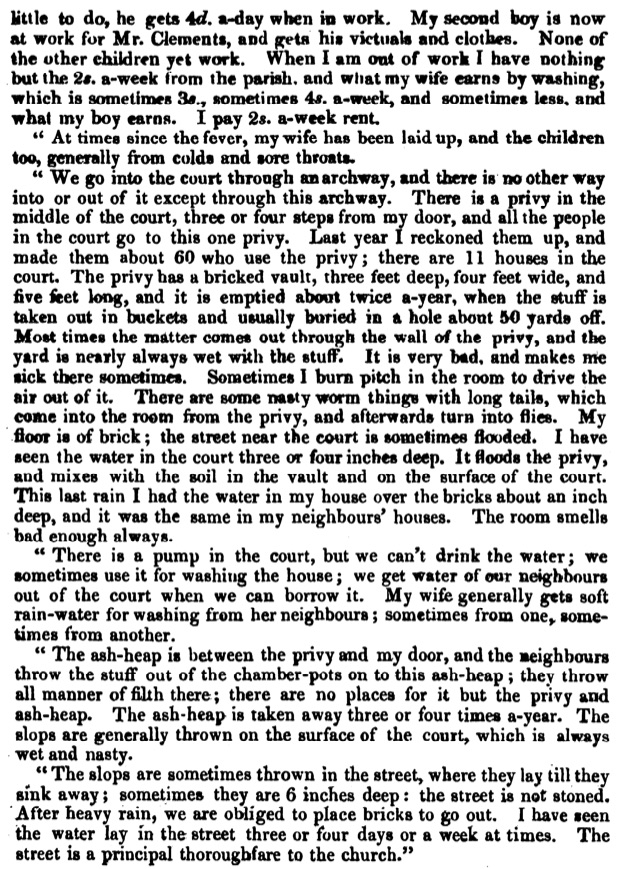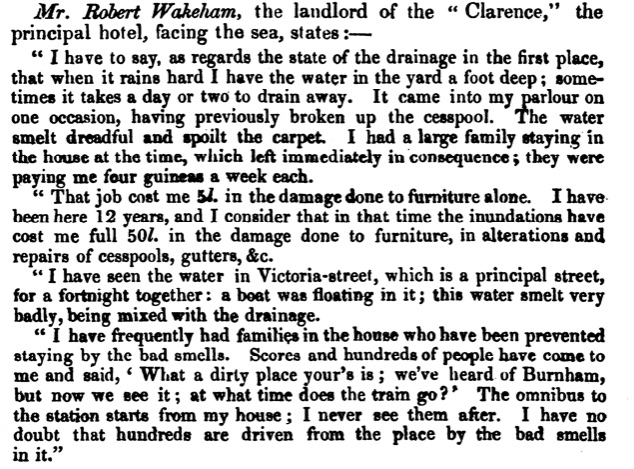Extracts from evidence:
The Commissioners of Sewers for Somerset were responsible for drainage. Surface drainage consisted of main water courses called rhymes, with flood gates, and numerous communicating ditches. There were 3 outfalls into the River Blue. This had been little improved for at least 50 years, said John Buncombe (surveyor) and was insufficient for the growing town.
Buncombe added that Edithmead and Love lane were often impassable to pedestrians during winter due to flooding, with water up to a foot deep for lengthy periods. George Reed reported that more outlying areas were sometimes underwater to the depth of two and a half feet. Despite this there were a good many dry ditches in summer, despite landowners’ efforts to keep them full. This variation had untoward effects on crops and livestock, causing failure and disease.
It seems that certain landowners in the Parish had opposed and prevented previous attempts by residents to improve the situation.
George Reed claimed that Burnham was notorious in London and in newspapers for its bad drainage, it being said that no-one would live there who had the means of living elsewhere. Mr Williams stated that Visitors soon leave on account of the bad smells and would probably not come twice.
Mr P.H. WIlliams (surgeon): “The marshes are never free from fog in some parts; and in the evening, particularly, the exhalation from the common ditches is dreadful…The diseases, generally speaking, of our marsh country are very much aggravated along the whole of our sea coast, from want of drainage….If we have a long continuance of very hot dry weather in the summer, so that the deposit of the ditches is much exposed, and we do not get an early rain in the autumn to cover it over, it soon shows itself isn the production of fevers of every description….The health of the poorer classes is especially affected by it, and they are often for long times together incapacitated from work….The only water at the command of the poor classes is that stagnating in the ditches; and the rich are not much better off in this respect. Filters are in common use in the better class of houses; and it is common practice to boil the water to destroy the insects in it.”
Walter Board (surgeon): “The effect of dampness in the houses, caused by the want of subsoil drainage, and also by the inundation; is very sensible in the deteriorating health of the district.
Henry Morse (agricultural labourer): “I have no pig myself. When the water is up the neighbours take their pigs out of the styes, or they would be drowned, and put them into neighbours’ styes further off. Some of the cottages have gardens, and the things are sometimes spoilt by the floods.”
Samuel Hobbes (solicitor): “ I have been in the habit (almost constantly during the summer season) of coming to Burnham, and in my drive I have had occasion to observe the state of the drains and ditches at the sides of the road, which are of themselves a complete nuisance. There are many places where (knowing the spots) I have actually held my breath in passing. These in summer may be smelt for 100 yards before and after passing them, and there are four or five such between this and Highbridge.”
John Gunter : “the ditches in the town and throughout the parish are nothing better than elongated cesspools…..the provision for the disposal of the excrementitious refuse and the house slops consists either of covered cesspools, of open holes or pits, of open stagnant ditches, or of drains to the sea….The covered cesspool is the mode in common use in the centre of the town, where the sandy substratum is not only favourable for their construction, but also permits the escape of the fluids when they are in use…..The town is chiefly supplied with water from wells of small depth, sunk in the substratum of sand; but many of the inferior class of houses, situated near the outskirts, have no other water at command than that contained in the stagnant ditches.”
Thomas King (builder): “I own several houses having no other drainage than into cesspools’ which are lined with stone or brickwork, but are not water-tight. The fluid drains away through the sand. The cesspools are emptied about twice a year, and the matter is put into house dug in the sand to receive it. The emptying of the cesspool of my own house costs me 20s. yearly. The cesspools are 30 feet from the well, but the drain from the water closet passes within 10 feet of the area. I have found the water of the well affected by percolation of the matter of the drain. I cannot now use the water for culinary purposes, and have not been able to do so for two years past. I borrow water from neighbours, which is fetched by my own family, otherwise it would cost me about a shilling a week.
CHURCH AREA:
Joel Norris (Draper): “A nearly always stagnant ditch passes along at the side of the main street, in front of my house; the privies of 11 houses drain into this ditch the whole both of their fluid and solid matters, and it receives, in addition the drainage of a large number of animals kept by the occupants of the houses. The first house is tenanted by a man who keeps, donkeys, pigs, ducks and fowls : he is a poulterer : his yard is six yards wide, and 20 yards long. The occupier of the second house keeps a horse, and usually two pigs. The occupier of the third keeps a horse. The four next are cottages, the inmates of which generally keep pigs. Next to these is a double house, used as a parish school, which is attended by, on the average, 60 children, and which has two privies. The last house has one privy, which is much exposed, and a public nuisance. The dung of the whole of the animals kept by the occupiers of these houses either drains or is thrown or swept into the ditch, with exception of some of the horses’. …The road alongside this ditch is the principle thoroughfare from the station to the church, and the adjoining parishes…..There are on average, about 150 people who use the privies, and the whole of whose excrement passes into the ditch, besides that of the animals….The ditch was cleaned out about three years ago, and the matter was thrown into the road where it lay for more than a month, and vehicles were obliged to be driven through it at first, as it spread over a good deal. It was at last carted on to the land for manure….. The four cottages were formerly called Bug Row, they are now called Parliament Row.”….The water in the ditch beformentioned, when it reaches a certain height, overflows into a mud-catch, communicating with another ditch and at these times- that is, swollen by the surface water- there is a slight current in it. The mud catch is 56 yards long and 15 feet wide, and from 9 to 11 feet deep, and it receives, in addition, the refuse of five houses: one of these is a school, another a bakehouse, the third is occupied by a tailor, with a wife and 10 children, and the last, my ow house, who have a wife, three children, and a servant…..by the time the ditch has reached the point opposite Mr Reed’s gate, it has received the refuse of 30 more houses, and at seven of these 102 pigs are now kept, and at times two horses besides, and the sullage of these animals also passes into it. The inmates of 16 houses in Love-lane, take the whole of their water from the opposite to drink…..In Oxford-street there are four houses having only 1 privy, with a cesspool which runs over occasionally : the well is seven yards from the cesspool, and the water cannot be drunk, being affected by the drainage. The water was good when the well was first sank. The first house was occupied by a man who sold fish, and who used to go to the pump to cleanse them, and used to throw the foul water on the surface of the ground, and it soaked into the well….The next house to these four has a privy with an open cesspit : the next is adjoining a school, with a privy and an open cesspit, which is most offensive. The next is a large house divided into three tenements : it has one privy, which discharges into a ditch at the back, where the matter stagnates : close to this a bridge to a church path…..In Victoria-place [probably the northern portion of Victoria St] there are 19 houses having 14 privies, which all discharge into cesspools – some closed, some open : one of these houses is occupied by a butcher, who keeps ordinarily two horses and two pigs : he has an open cesspit seven feet square and the same depth, in which he deposits the privy soil and offal…..I sustain a heavy loss, I have not the least doubt, by the bad state of this ditch. People will not come into my shop on account the bad smells. I estimate the loss at about 20l a-year : I could almost swear to it. The smells annoy me much. At times we are obliged to keep every door and window shut, shop-door and all……I had fever in my house nearly all last summer. I have a wife and three children, and my family have hardly had a day’s health during the year, that we have been in the house : the children were attacked with scarlet fever…..My wife has suffered ten times as much as before since she has been in this house: she now complains of dreadful headaches, particularly in the morning”
George Reed: “I reside near the Church at Burnham, and have premises which cost me upward of £4,000 with no drains. In the summer time I cannot go out by the carriage drive on the south-east side of my house, on account of the offensiveness of the ditch, which is the same as that described by the witness Norris. [Dr Pope told me] that if I took a candle out on a quiet night the air over this ditch would take fire. I I knew how to improve the drainage I would do it. The upper part of this ditch and the open drains leading to it have, at times, overflowed, and the matter has laws on the road for days together to the nuisance of all in the neighbourhood. The last time it overflowed it cost me £5 to get rid of it. It has spoilt the well of water in my house; and I have been obliged to sink another to obtain proper water for the use of my family.”
John Gunter: “I have a house in this town adjoining the churchyard….. I bought a small property there, but the whole of the ground around it, and the parish ditch in from was so bad that I found it impossible to live near it…the water from the drains ,mixed with the soil from the privy, occasionally flooded the kitchen. I rebuilt my house and raised it, and drained it to the only outfall I could command, viz., the open ditch in front, into which the whole of the soil and slops of my house is now passed, and which, as an addition, receives the drainage of eight cottages and that of the churchyard……the graves are made very shallow on my side of the yard; I have seen them not more than four feet deep; I have a well on my premises the water of which was formerly excellent, but it is now affected from some cause or other, and I attribute it to drainage from the churchyard. We have no other water, and are, therefore, compelled to use this; I certainly don’t fancy it….It would be a great blessing to the poor here if public pumps were erected from which pure water might be drawn; at present there is not a single pump in the place.”
Mr P.J. Petherick (stationer): “It does not require a heavy fall of rain to flood Victoria -street, the principal street in the town. There is no raised part to it, and the whole width is flooded. I have heard visitors say, looking at the water, ‘This is a watering-place indeed’”
UNITY PLACE:
[The exact location of Unity Place is not known, judging from the description it was likely to have been in the area between the mason’s Arms and what is now Chapel St, or just possibly in the George St area. No obvious candidates present on the maps of 1840 or 1844-88 so it is possible that it was a group of short-lived dwellings]


Mr Board: “Every year in the summer scarlet fever has prevailed in the town, and particularly in Unity-place”
Mr F.R. Chadwick (surgeon): “In the summer of 1847 there was a good deal of scarletina in the town; but it was principally confined to Unity-place, no doubt arising from the accumulations of filth there.”
SEA FRONT:
Mr P.H. Williams: “ From Prew’s terrace, a drain leads to the sea wall, the mouth of which is exposed, except at and near high-water spring tides, and the matter driving from it smells abominably, particularly in the afternoon, when the sun lays directly upon the wall.The Royal parade is very bad: some friends of mine took lodgings in a house adjoining the Royal parade, and were obliged to leave them on account of both their children having fever; from that house there is no drainage whatever, except into a small pit at the back door: these houses I have mentioned all front the sea, and constitute the best part of Burnham. I called one morning to see a patient lodging in one of them, when a very refined lady told me she had been compelled to smoke a cigar during the night, solely for self-preservation from the disgusting smells. I am certain this lady had never smoked before and believe she has not since; it was a scented cigar.”

The report issued a number of recommendations, including the seeking of Parliamentary powers for the Local Board of Health to effect improvements to surface and subsoil drainage and irrigation.
